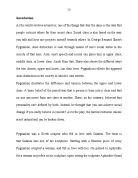Write an essay to show the importance of secondary characters in Pygmalion
…Write an essay to show the importance of secondary character in Pygmalion…
Any work, project, product line can’t be accomplished without the cooperation between all primary and secondary workers. Secondary characters are complementary for the primary character, to achieve a specific target or goal. This is why many project can successes or fail. Pygmalion is a comedy about a phonetics expert who, as a kind of social experiment, attempts to make a lady out of an uneducated Cockney flower-girl. The reaction of secondary character was important, and their role in conveying and make the idea of the play more clear for the readers.
“What is middle class morality? Just an excuse for never giving me anything”.Alfred Doolittle is a smooth-talking garbage man, a serial monogamist (although he's not always really married), a drunk, and a deadbeat dad. He's got a lot to say about "middle class morality" and complicated theories about the deserving and undeserving poor. He has principles, too, but they're not exactly conventional: he has no trouble milking five pounds from Higgins, but he doesn't want any more than that. He wants just enough money to have a few drinks and some fun. In order to understand Doolittle, you have to understand how he speaks.
DOOLITTLE ["most musical, most melancholy"] I'll tell you, Governor, if you'll only let me get a word in. I'm willing to tell you. I'm wanting to tell you. I'm waiting to tell you.
HIGGINS. Pickering: this chap has a certain natural gift of rhetoric. Observe the rhythm of his native woodnotes wild. "I'm willing to tell you: I'm wanting to tell you: I'm waiting to tell you." Sentimental rhetoric! That's the Welsh strain in him. It also accounts for his mendacity and dishonesty.
He is the sum of his mysterious speaking ability. You can describe what Doolittle's saying with all sorts of fancy Greek words, but it's enough to note how he repeats those three phrases that Higgins singles out, and how his speech is sort of singsong-y. Whether or not we believe what Doolittle's talking about doesn't matter, it sounds nice. These skills get Doolittle into trouble when Higgins nominates him for some such speaking position…and he gets it, along with a generous income. He can't handle all the money; he doesn't want to be "touched" – asked to spare some change – in the same way he touched Higgins.Doolittle demonstrates how powerful and potentially dangerous words can be. Lucky for us, his intentions are (mostly) honorable. He's the character most prone to lecturing – yes, even more so than Higgins – and though his theories may not be entirely logical, his little sermons do raise some issues regarding class relations. Think of him this way: he's a stereotype of a drunken poor guy, with an oratorical twist.







